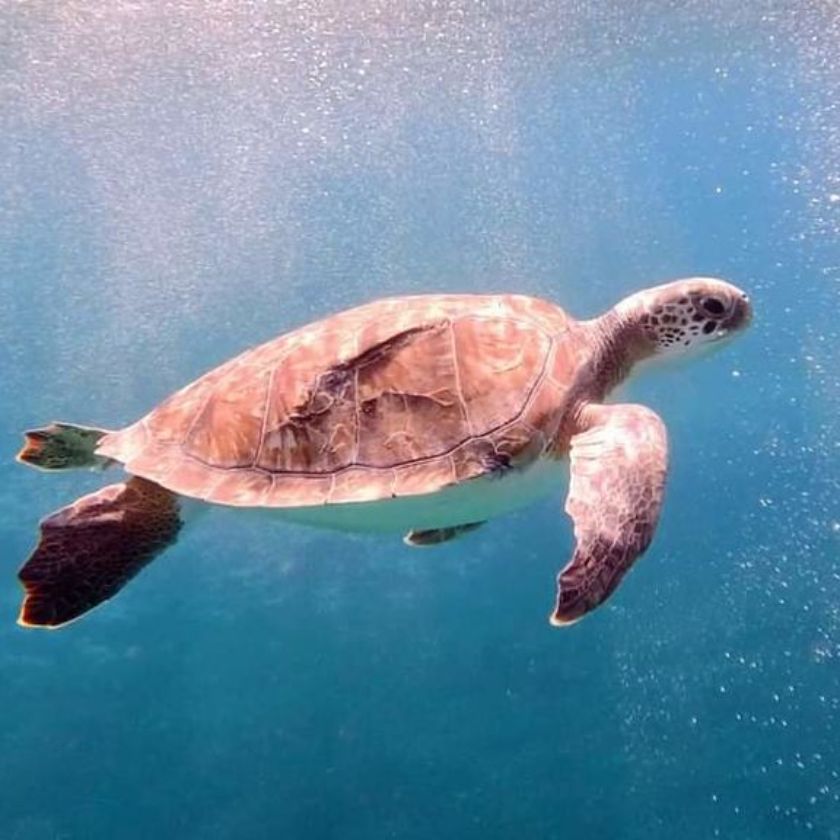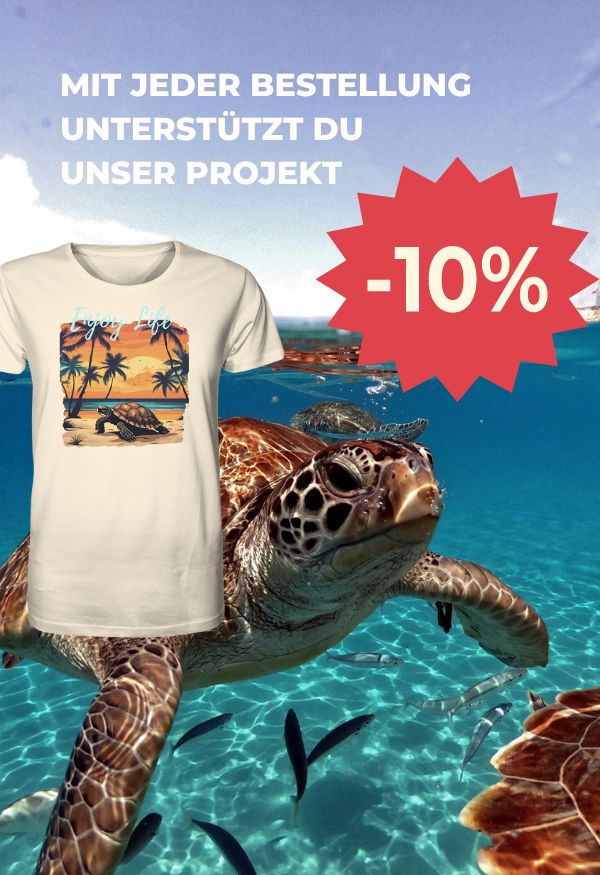Free shipping from €80
Free shipping from €80
PROTECT SEA TURTLES
by Chiara Fürst April 09, 2022 4 min read

How YOU can help the sea turtles
Sea turtles face many threats around the world, including global warming, overfishing and plastic pollution in the oceans. Here you can find out how you as an individual can counteract these threats and support these wonderful animals.Do not touch, feed or chase
If you are on holiday by the sea and are lucky enough to come across a sea turtle, please do not go too close to it and do not chase it. This is very stressful for the turtle and in the worst case scenario it can prevent it from diving to the surface to breathe. Feeding and touching the turtles is also an absolute no-go! Sea turtles prefer to eat algae or small sea creatures and do not need any additional food from us humans. Foreign food can be very harmful and is much less nutritious than their natural food.
Since the number of turtle sightings has increased in Cyprus, we have unfortunately noticed that many people come and feed the animals. Within just one year, we have already noticed a change in behavior. When we dive, we carry a second regulator as a backup. This regulator is marked yellow so that it can be seen easily underwater. Since the sea turtles are fed lettuce, which is often yellowish/green, we have seen more and more often that the sea turtles swim towards the divers and try to grab the regulator. This is probably because they confuse it with lettuce.
Turtles also sense when their shells are touched, so touching them can be very disturbing. In addition, there is an exchange of bacteria between the animal and the human, which can be harmful to both parties.
Reduce and recycle plastic consumption
Plastic pollution in nature is increasing and an estimated 14 million tons end up in the sea every year. This threatens all types of marine life, as they can get tangled up in the garbage or mistake it for food, which in most cases is fatal. So try to reduce your plastic consumption as much as possible. Whether it's reusable bottles and carrier bags, shampoos or detergents, there are many alternatives.
This also includes the correct disposal and recycling of plastic and other waste products. This means that plastic can also be recycled and does not end up in landfills or in nature.
Eat less fish and seafood
A lot of sea turtles and other marine life end up as bycatch - i.e. unwanted - in fishing nets. By reducing your fish consumption or even giving up fish and seafood altogether, you stop supporting wild-caught fishing. If you can't give up fish or seafood completely, pay attention to the fishing method and the origin of the products. Longlines, trawl nets and gill nets have the highest bycatch rate and should therefore be avoided.
Share information
It is very important that information like this is passed on – whether to friends, family or acquaintances. The more people know about the dangers of sea turtles and what can be done about them, the better. Especially with social media, it is very easy to share this information. We as Diving school constantly pass on information and educate people on how to behave properly with sea creatures.
Don’t buy turtle souvenirs
The deliberate capture and killing of sea turtles is unfortunately still a big problem. The beautiful pattern on the shell leads to the sea turtles being killed to sell souvenirs. So if you are on vacation and see a souvenir made of turtle shell, don't buy it. If you are not sure whether it is real or fake, ask and always be on the safe side by not buying it. The same goes for turtle soup, by the way.
Climate-friendly living
Global warming poses a very great threat to sea turtles. Weather conditions are becoming more and more extreme, which is destroying the turtles' nesting sites and habitat. The sex of sea turtles depends on temperature; warmer temperatures produce more females, and colder temperatures produce more males. Global warming therefore produces many more females, which can have a negative impact on the entire turtle population. The rising water temperatures also mean that sea turtles are much more susceptible to disease. So by trying to live a more climate-neutral life, you are not only helping sea turtles, but many other species.
Turn off lights on the beach
If you are one of the lucky people who own a beach house, please turn off the lights at night. If sea turtles are nesting on that beach, you are helping the babies find their way to the sea. They find their way to the sea by following the reflected moonlight. In large hotel complexes and built-up beaches, it often happens that the hatched turtles follow this light and go in the wrong direction. The chance of survival is therefore very low.
Safe boating
If you rent or own a boat on holiday, always follow local rules and keep a safe distance from the beach. Sea turtles often stay close to the shore where there is plenty of sea grass. When they come up for air, it can be very dangerous if there are many boats at sea. So, safely bypassing and driving slowly can help to see turtles early and give them enough time to submerge again.
Support turtle protection projects
The sea turtles in the Mediterranean still receive less attention than those in tropical waters. But fortunately there are now many organizations in the Mediterranean that are actively committed to protecting these wonderful animals. These organizations and projects often rely on donations and are happy to receive any kind of help. Of course, this includes us at Ocean Support Kistler. With your donations we cover, among other things, our ongoing costs for removing ghost nets around Cyprus. You can also support us by wearing XENIOS fashion . This is trendy clothing that is of course produced in an environmentally friendly and sustainable way. 10% of your order goes directly to protecting the sea turtles.
Leave a comment

10% off your first order!
We are grateful for every order to further advance our Xenios project! Get 10% off your first order with the discount code:
TURTLE LOVE
